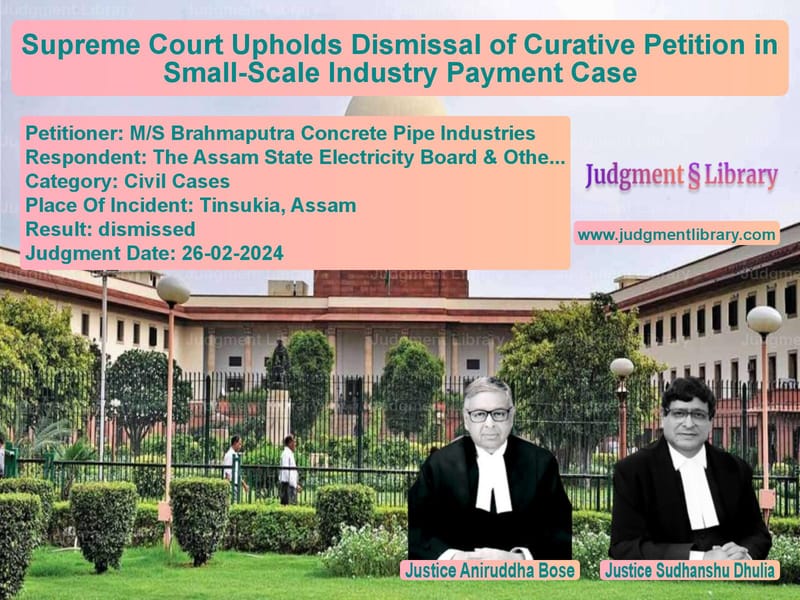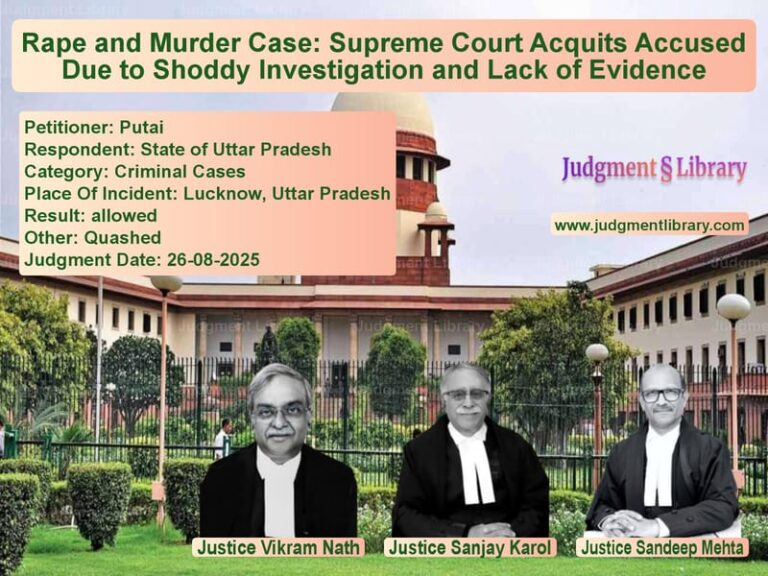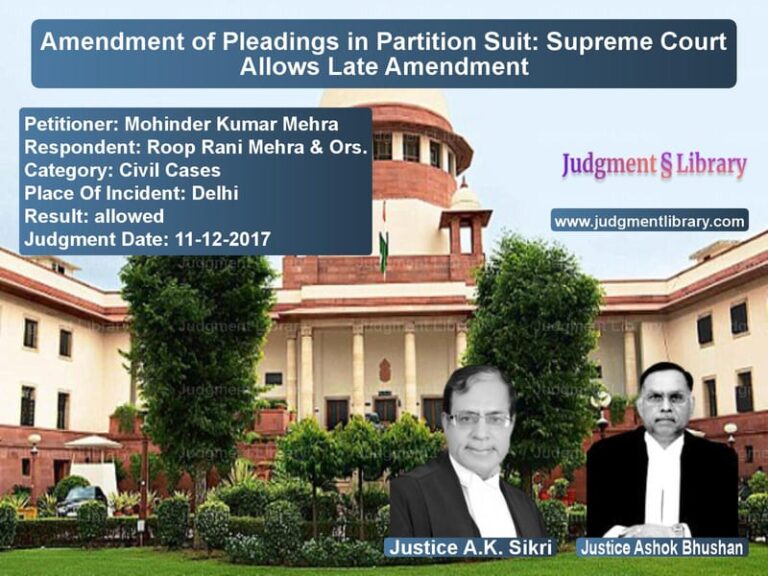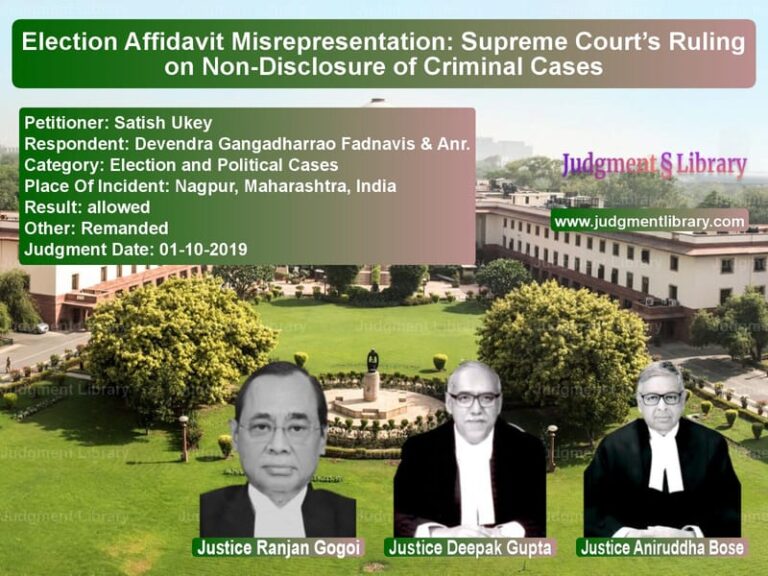Supreme Court Upholds Dismissal of Curative Petition in Small-Scale Industry Payment Case
The Supreme Court, in M/S Brahmaputra Concrete Pipe Industries v. The Assam State Electricity Board & Others, dismissed a curative petition filed by small-scale industrial undertakings seeking interest on delayed payments. The judgment clarifies the limited scope of curative petitions and reinforces the procedural boundaries established under Supreme Court Rules, 2013.
Background of the Case
The case originates from a dispute over delayed payments under the Interest on Delayed Payments to Small Scale and Ancillary Industrial Undertakings Act, 1993 (the 1993 Act). The appellants had filed a suit in the Civil Judge, Senior Division, Tinsukia, Assam, which ruled in their favor. However, the Gauhati High Court overturned this decision, holding that transactions prior to September 23, 1992—the date the ordinance preceding the 1993 Act was promulgated—were not eligible for interest under the Act.
The Supreme Court had dismissed the appeal against the High Court’s decision on January 23, 2019, and later rejected the review petition on December 18, 2019, after an open court hearing. The appellants subsequently filed curative petitions challenging the decision.
Legal Issues Considered
The primary legal questions before the Court were:
- Whether the curative petition was maintainable when the review petition had been dismissed after an open court hearing.
- Whether the dismissal of the review petition met the criteria for reconsideration under curative jurisdiction.
- Whether a delay of 10 months in filing the curative petition affected its admissibility.
Petitioner’s Arguments
The appellants contended:
- The Supreme Court’s earlier ruling was erroneous as it failed to consider transactions where invoices were raised after the enactment of the 1993 Act.
- The curative petition should be entertained to correct the miscarriage of justice.
- The Registrar had no jurisdiction to dismiss the curative petition at the registration stage, and the matter should have been placed before a Bench.
Respondent’s Arguments
The Assam State Electricity Board argued:
- The curative petition was not maintainable as the review petition had already been dismissed after an open court hearing.
- The 1993 Act did not apply retrospectively, and claims predating September 23, 1992, were invalid.
- The petitioners had delayed filing the curative petition, which should have been filed within a reasonable time.
Supreme Court’s Observations
The Bench comprising Justices Aniruddha Bose and Sudhanshu Dhulia reaffirmed that curative jurisdiction is exercised only in exceptional cases of miscarriage of justice. The Court noted:
- “Curative petitions are not a second opportunity for review but exist to correct gross miscarriages of justice.”
- “The curative petition must specifically state that the grounds raised were taken in the review petition and that it was dismissed by circulation.”
- “In this case, the review petition was dismissed after an open court hearing, which falls outside the ambit of curative jurisdiction.”
- “There was a 10-month delay in filing the curative petition, and no reasonable justification for the delay was provided.”
Key Legal Findings
- Curative petitions must meet strict criteria and cannot be used as an extension of review jurisdiction.
- The Registrar’s role is limited to procedural compliance, but final decisions on curative petitions must be taken by a Bench.
- The 1993 Act does not apply retroactively to transactions before September 23, 1992.
- Dismissal of a review petition after open court hearing generally precludes curative relief.
Final Judgment
The Supreme Court ruled:
“The appeal is dismissed. The curative petition does not meet the criteria for re-examination under inherent jurisdiction.”
The judgment also applies to five other similar miscellaneous applications filed by different industrial undertakings.
Key Takeaways from the Judgment
- Curative petitions are not an automatic recourse after dismissal of review petitions.
- Open court hearings of review petitions limit the scope for curative petitions.
- Registrar cannot unilaterally reject a curative petition; the matter must be placed before a Bench.
- The 1993 Act does not apply retrospectively, reinforcing contractual certainty.
Impact of the Judgment
This ruling reinforces judicial discipline in entertaining curative petitions and strengthens procedural rigor. The judgment ensures:
- Curative petitions remain an exceptional remedy rather than an alternative appellate mechanism.
- Finality of decisions in cases where review petitions have been dismissed in open court.
- Industrial undertakings must establish clear eligibility criteria before seeking interest on delayed payments under the 1993 Act.
Conclusion
The Supreme Court’s ruling in M/S Brahmaputra Concrete Pipe Industries v. The Assam State Electricity Board underscores the restrictive nature of curative jurisdiction. By affirming procedural compliance and legal finality, the judgment serves as a precedent for future disputes involving curative petitions and retrospective application of financial statutes.
Read also: https://judgmentlibrary.com/supreme-court-resolves-dispute-over-temple-owned-shops-in-tamil-nadu/
Petitioner Name: M/S Brahmaputra Concrete Pipe Industries.Respondent Name: The Assam State Electricity Board & Others.Judgment By: Justice Aniruddha Bose, Justice Sudhanshu Dhulia.Place Of Incident: Tinsukia, Assam.Judgment Date: 26-02-2024.
Don’t miss out on the full details! Download the complete judgment in PDF format below and gain valuable insights instantly!
Download Judgment: ms-brahmaputra-conc-vs-the-assam-state-elec-supreme-court-of-india-judgment-dated-26-02-2024.pdf
Directly Download Judgment: Directly download this Judgment
See all petitions in Contract Disputes
See all petitions in Judgment by Aniruddha Bose
See all petitions in Judgment by Sudhanshu Dhulia
See all petitions in dismissed
See all petitions in supreme court of India judgments February 2024
See all petitions in 2024 judgments
See all posts in Civil Cases Category
See all allowed petitions in Civil Cases Category
See all Dismissed petitions in Civil Cases Category
See all partially allowed petitions in Civil Cases Category







